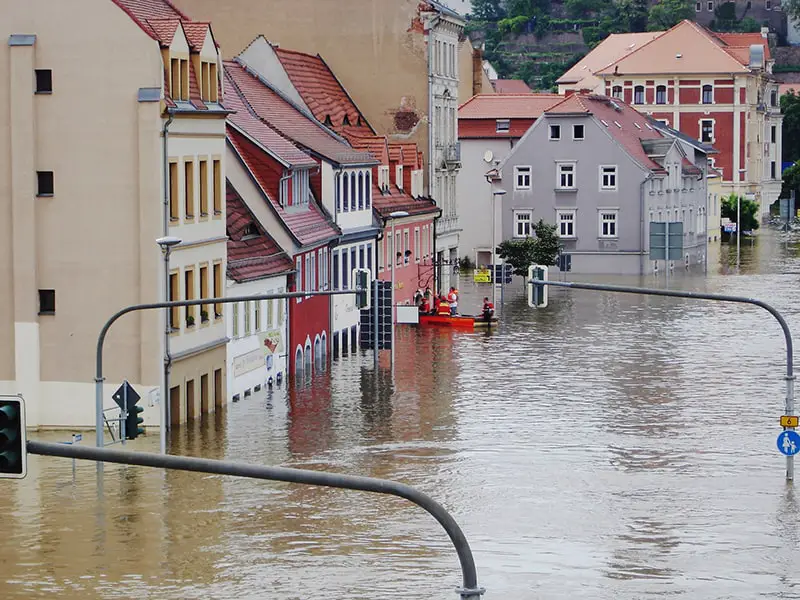Click here to get this post in PDF

It is never easy to deal with the aftermath of an act of God. Hurricanes, earthquakes, tsunamis and floods can have a huge impact on your operations and will greatly affect your business logistically and financially, no matter how you handle them. However, the more prepare you are, the better you can deal with the disaster and minimize the negative impacts on your business.
Without appropriate crisis planning, it can be very tough for businesses to deal with damage, recover their losses and resume operations. Depending on where you operate, your business may be vulnerable to a range of natural disasters. With climate change, we are seeing an increase in the occurrence of these disasters: many areas are seeing more frequent and more severe natural disasters, and new areas are becoming vulnerable to disasters that they may never have seen before.
In this article, we’re going to take a look at the important things you can do to safeguard your business against natural disasters.
Plan for Future Emergency Operations
If a natural disaster affects the operations of your business, what would your next step be? There is no simple answer to this question, and it requires a comprehensive response. You need to have a solid emergency plan in place to deal with natural disasters.
You need to develop and effective, thorough plan that includes areas such as:
- Remote operational capability
- Communication in the absence of Internet services
- Maintenance of emergency and safety kits at physical workspaces
- Safe evacuation plans and frequent mock drills
- Updated employee records for contacting in times of distress
- Delegation of specific responsibilities
- Emergency funds
This emergency plan cannot be created by one person alone. You should involve your team and ask for active feedback on the plan. This will help to ensure that you have covered all necessary areas and have a comprehensive response to all possible scenarios.
Create Data Backups
It is almost impossible to re-create paperwork or bring back lost documents. Therefore creating regular backups of business-related data and records is critically important. Some of the vital documents that need to be backed up include:
- Payroll data
- Insurance claims and documents
- Tax forms
- Client information
The best way to safeguard sensitive data is to back it up in the cloud. You can upload, scan, or even sync your important data into cloud storage systems. Cloud backups cannot be destroyed, no matter the magnitude of a natural disaster. On the other hand, physical backups could be damaged or lost during a natural disaster.
Effective backup will avoid panic, prevents data loss, and will allow you to resume operations as soon as possible.
Document Company Assets
You should be well-informed about all aspects of your insurance policy and what it covers. For instance, if you have a business interruption policy, the clauses may include specific disasters that are covered by the insurance, while others are not covered.
You must keep documentation for each claim you may present in the future. You do not need receipts for each asset, but it is advisable to keep some evidence like pictures or bills. This will help to ensure that you get the reimbursement you deserve.
Communicate
Whether during a natural disaster or otherwise, communication is key. An emergency plan should include how you will maintain communication with your employees as well as your clients. It is important to keep yourself informed of everyone’s situation so you can assist staff or clients if required.
Communicating With Clients
As soon as internet services have resumed, businesses update their customers on social media about their current operational status. Moreover, post-disaster communications should include current contact information for customers to reach you.
Other key details to include in social media posts or emails to customers are:
- Change in work hours
- Change in shipping or delivery
- Estimated resumption of services
Communicating With Employees
Staying connected to employees is essential in times of a natural disaster. Management must check up on employees to ensure their safety as well as assist them with relocation, and other necessities. It is crucial to have an emergency disaster fund in place for such situations. A disaster fund allows you to pay your employees even if your business finds itself with little or no incoming revenue.
Get Help from Insurance Advisors
Companies are often unsure of what their insurance covers, and in these cases it is important to consult an insurance advisor about your emergency plan. Insurance advisors can review your business’s existing policy as well as recommend additions or alternative policies. With their help, you can make sure you’re properly insured in the event of a disaster.
Insurance Policies Businesses Should Consider
After consulting with your insurance advisor, you should research and compare the different insurance policies that are available to you. Property insurance covers damage to workplaces, equipment like credit card machines, biometric devices, computers, generators, as well as documents and files. Such insurance can also be adapted to include custom clauses.
Business interruption coverage is also a necessary part of your insurance. This means you’ll receive reimbursement for losses incurred during natural disasters. Remember that it is crucial to read and review each clause of your business’s insurance policy very carefully.
Is Your Business Prepared for a Natural Disaster?
Summing Up
Natural disasters are a common risk faced by many businesses. Your business may be lucky enough to never suffer from such a disaster. However, it is better to prepare than to regret it later. Staying up to date with workplace safety standards, insurance policies, and emergency fund implementation strategies can remarkably increase your business’s preparedness to deal with a natural disaster.
Image Source: Pixabay.com
